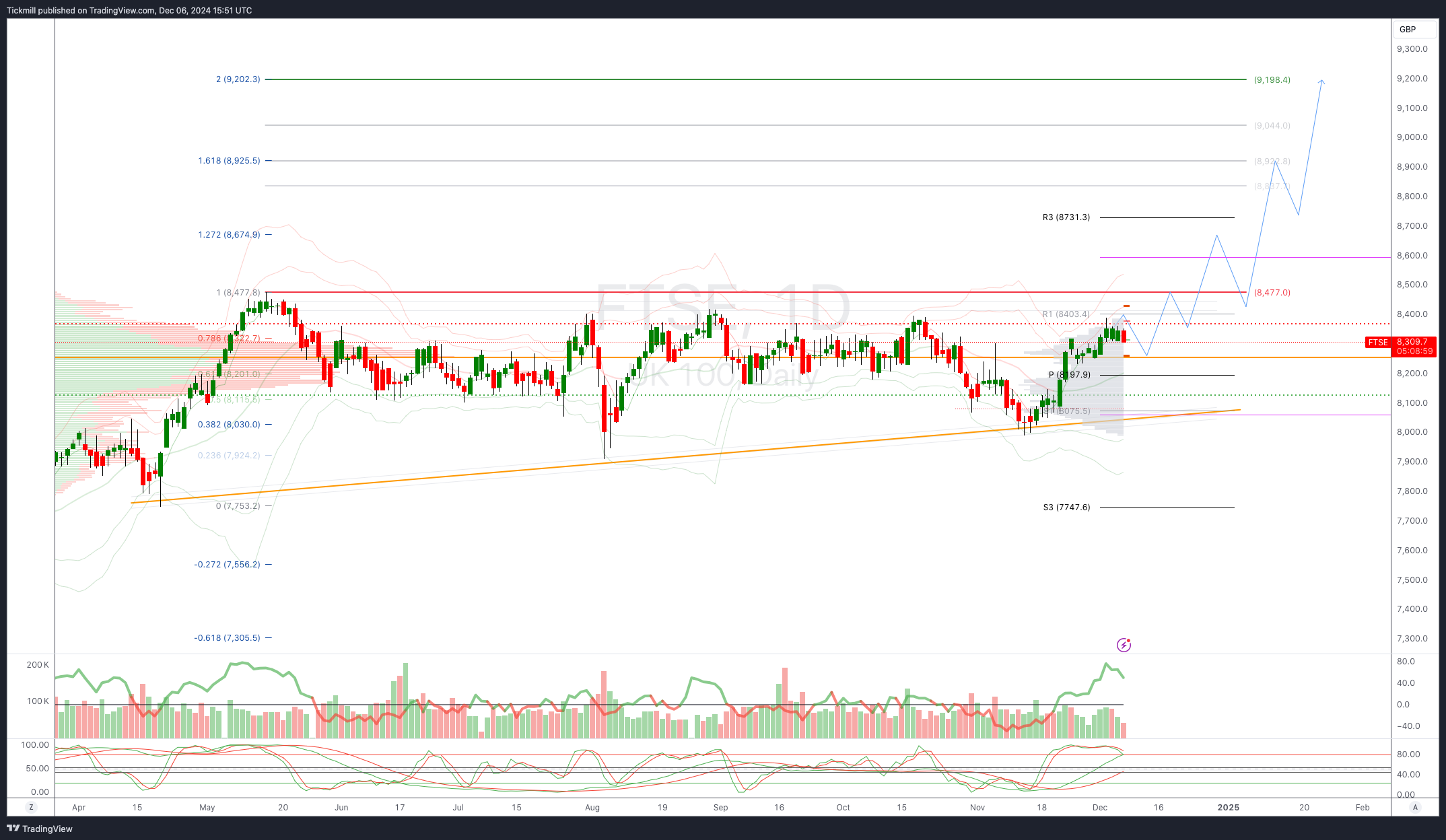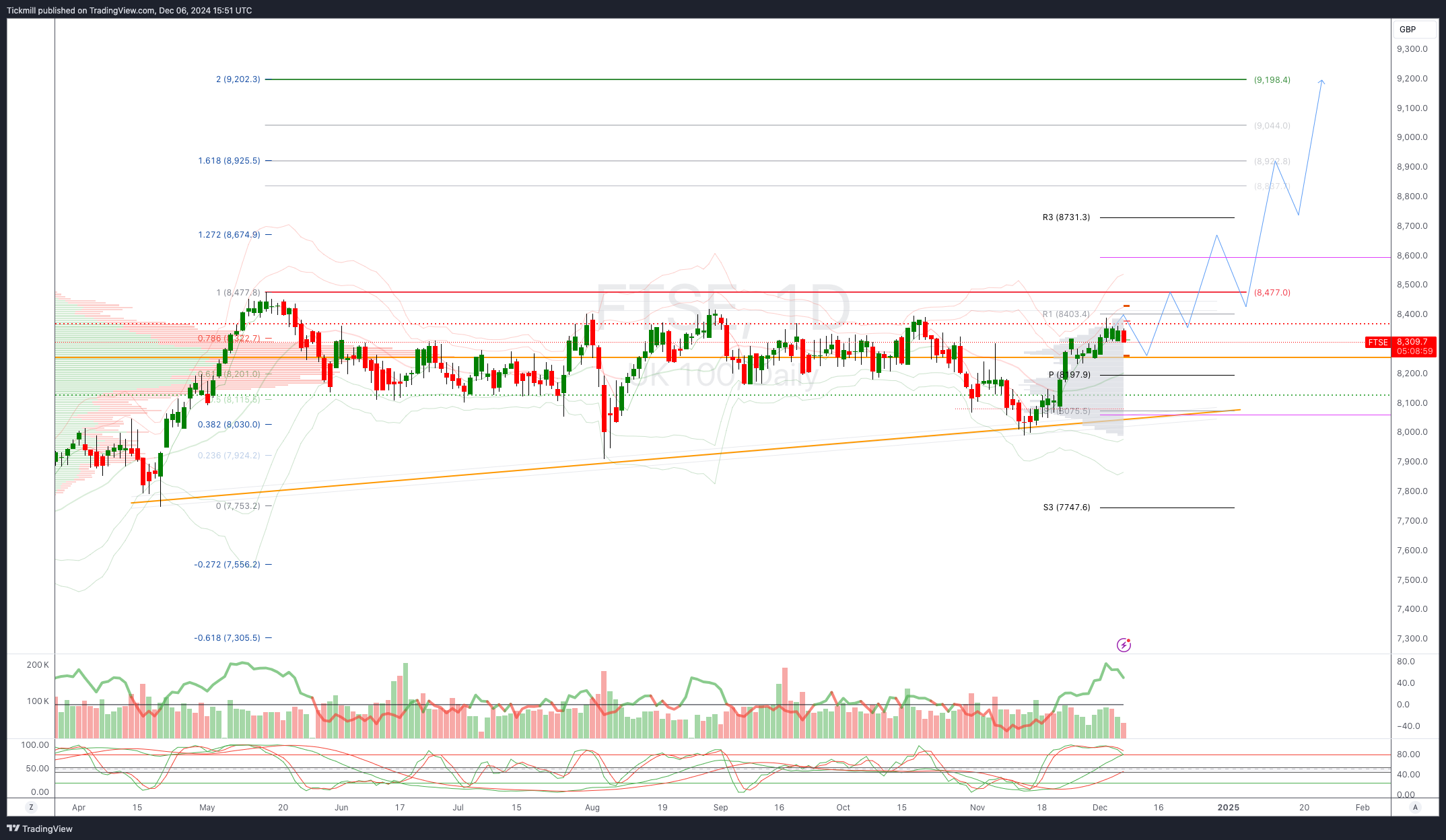The FTSE Finish Line: December 6 - 2024
FTSE Fails Again AT 8400 Resistance
The FTSE 100, the UK's main stock index, fell on Friday, weighed down by declines in defence and utility shares, while Direct Line surged following Aviva's decision to acquire the insurer. The blue-chip index was down 0.4% heading into the close. Halifax reported that the UK property market picked up pace in November, with a notable 1.3% increase in house prices compared to October. This surge represents the most significant monthly gain for the year. On an annual scale, property prices grew by 4.8%, the highest rate of growth seen since November 2022. In an interview, Jonathan Reynolds, Britain's business and trade minister, indicated that the country will thoughtfully assess its response if Donald Trump's upcoming administration introduces new tariffs. Domestic investors are anxious following Trump’s proposal for broad tariffs of 10% to 20% on nearly all imports, particularly as he has already pledged significant tariffs on Canada, Mexico, and China. Additionally, Megan Greene, a policymaker at the Bank of England, stated on Thursday that it is still unclear whether the increased U.S. tariffs would result in higher or lower inflation in the UK.
Single Stock Stories:
UK Direct Line saw a significant gain of 7.6%, bringing its share price close to a 2.5-year high of 254p, making it the top percentage gainer on the FTSE midcap index. The British insurer is poised to endorse Aviva's enhanced takeover proposal, valued at £3.61 billion ($4.6 billion), which includes a combination of cash and stock. This new offer values Direct Line at 275p per share, a notable increase from the rejected bid of 250p in cash and shares from the previous week. Under British takeover regulations, Aviva has until December 25 to either formalise its offer or withdraw from the negotiations. Meanwhile, Aviva's share price increased slightly by 0.5%, reaching 491.8p. Year-to-date, Direct Line has climbed approximately 40%, compared to Aviva's 13% gain.
Shares of Berkeley Group Holdings decreased by as much as 2.3%, bringing the stock down to 4,072p and making it one of the top percentage losers on the FTSE 100 index. The British high-end home builder expressed a cautious outlook regarding near-term demand after reporting a nearly 8% decline in its first-half profits, with ongoing affordability concerns impacting sentiment within the sector. CEO Rob Perrins stated, "While we have seen a slight uptick in recent weeks, a meaningful recovery will require a sustained improvement in consumer confidence and stability in the wider macroeconomic environment." The company reported a first-half pre-tax profit of £275.1 million ($351 million), compared to £298 million the previous year. Currently, the stock is down 1.3%, bringing its year-to-date losses to approximately 12%.
Broker Updates:
Shares Spirax Group Plc fell by as much as 2.8% after JP Morgan downgraded its rating for the British manufacturer of steam management systems and peristaltic pumps, changing it from "overweight" to "neutral." The investment bank also lowered its target price from 9,300p to 7,800p. JP Morgan analysts indicated that there could be further downgrades to the FY25 forecasts in the near future due to adjustments in margin expectations, highlighting potential challenges for Spirax from its Steam Thermal Solutions operations in China. Among 18 analysts surveyed, four have rated Spirax as "buy" or higher, 12 as "hold," and two as "sell" or lower, with a median price target of 8,000p, according to LSEG data. Currently, the stock is at its session low, resulting in year-to-date losses of around 31%.
Technical & Trade View
FTSE Bias: Bullish Above Bearish below 8225
Primary support 8000
Below 8000 opens 7855
Primary objective 8600
Daily VWAP Bearish
Weekly VWAP Bullish

Disclaimer: The material provided is for information purposes only and should not be considered as investment advice. The views, information, or opinions expressed in the text belong solely to the author, and not to the author’s employer, organization, committee or other group or individual or company.
Past performance is not indicative of future results.
High Risk Warning: CFDs are complex instruments and come with a high risk of losing money rapidly due to leverage. 73% and 72% of retail investor accounts lose money when trading CFDs with Tickmill UK Ltd and Tickmill Europe Ltd respectively. You should consider whether you understand how CFDs work and whether you can afford to take the high risk of losing your money.
Futures and Options: Trading futures and options on margin carries a high degree of risk and may result in losses exceeding your initial investment. These products are not suitable for all investors. Ensure you fully understand the risks and take appropriate care to manage your risk.
Patrick has been involved in the financial markets for well over a decade as a self-educated professional trader and money manager. Flitting between the roles of market commentator, analyst and mentor, Patrick has improved the technical skills and psychological stance of literally hundreds of traders – coaching them to become savvy market operators!
